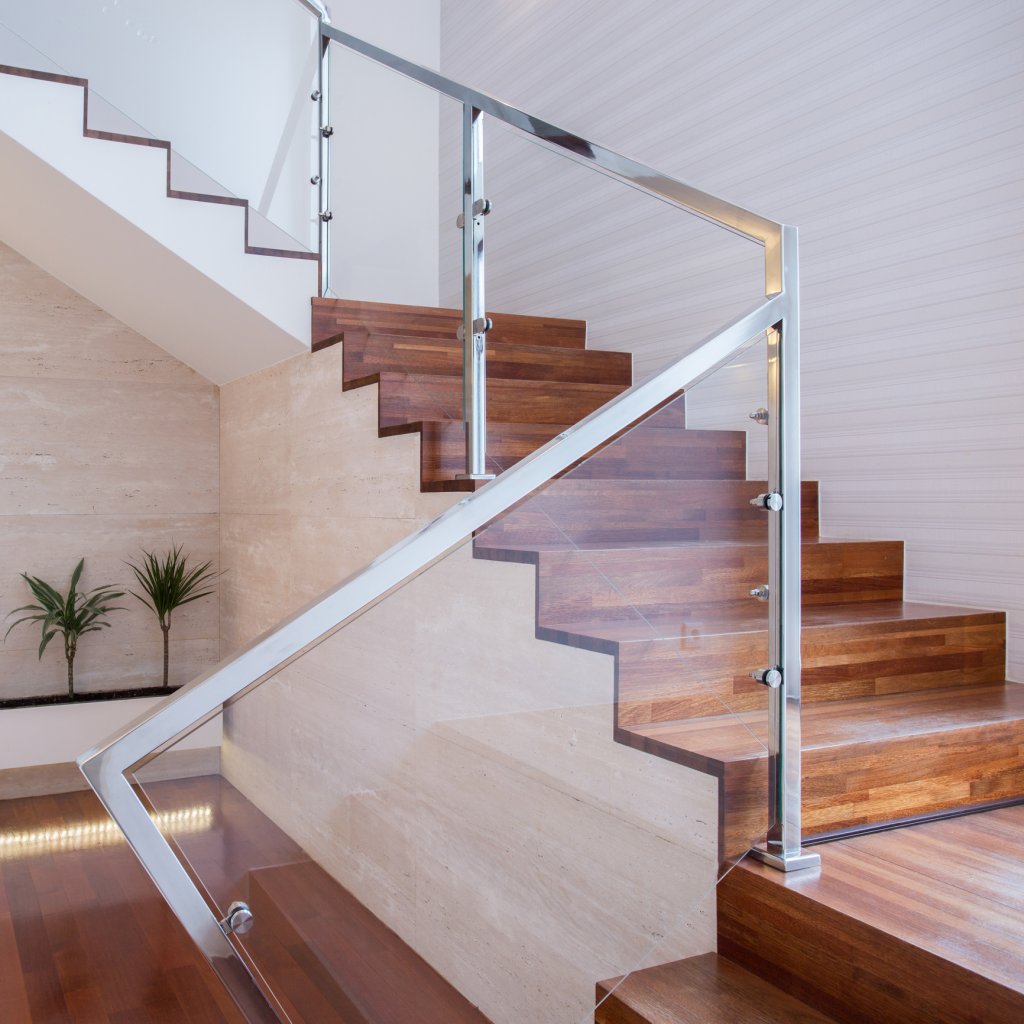Glass balustrades are a small addition to your office, home or terrace that can make a huge difference to how the space feels. Unlike traditional balustrades made from wooden columns, glass balustrades remove visual barriers and allow light to filter into the space uninterrupted.
There are many reasons why glass balustrades are quickly becoming a staple of any modern interior. In this guide, you’ll find everything you need to know about this sleek, modern design choice.
What are glass balustrades?
If you’ve stumbled upon this guide looking for some inspiration for your space’s interior, you might be asking yourself what exactly are glass balustrades? It’s easy to confuse balustrades with handrails or bannisters, but balustrades refer to a very specific component of a staircase or terrace — the section underneath the handrail or where the handrail would usually be found.
A balustrade is traditionally composed of a row of individual wooden columns, but modern developments have introduced the glass balustrade, which is composed of a row of solid glass panels with no gaps.
Balustrades were originally designed as a safety barrier, but have since become just as much about style as functionality. This is because the style of a balustrade can transform the aesthetic of a space or room. And because balustrades can be customised in a variety of sizes and with various finishes, there’s no limit to what you can create (provided it conforms to all safety regulations of course).

Where are glass balustrades used?
Traditional balustrades are most commonly associated with staircases, but glass balustrades have a variety of applications.
Staircases
Staircases may not be the only application, but they still remain one of the most popular places to install a glass balustrade. A glass handrail and balustrade together create a sleek, modern staircase that fits perfectly into any contemporary home or office.
Balconies
The transparency of glass balustrades means that you’ll get uninterrupted views from an external balcony.
Mezzanine floors
Glass balustrades are ideal for mezzanine floors, because they allow you to create different levels to a room while maintaining a bright and spacious feel.
Why glass balustrades?
Okay, you know what glass balustrades are, you know how they’re used — but how can they benefit you? Well if you haven’t already picked up on some of the great features and benefits of a glass balustrade, let us list them all out for you.
- Toughened glass provides strength and durability, which improves safety standards and increases longevity
- Sleek glass panels provide a premium and timeless appearance that can complement almost any interior
- Glass is much easier to clean and maintain than alternatives
- You’ll get unhindered views of your surroundings
- Glass invites plenty of natural light into the room, creating an open and bright feel
- Glass panels can be used internally or externally
- Glass balustrades can be made in various styles, sizes and finishes to suit your tastes
What type of glass is used for glass balustrades?
UK regulations allow the use of two types of safety glass: toughened/tempered glass or laminated glass.
Toughened/tempered glass is the most common type of glass used for balustrades. The manufacturing process involves exposing the glass to temperatures around 700°C before rapidly cooling it. The entire process takes around sixty seconds to complete but can increase the strength of the glass by up to 400%.
Another great benefit of tempered glass is that it shatters into small round pebbles instead of serrated shards. This makes cleaning up the glass easier and safer.
Laminated glass is one layer of plastic sandwiched between two layers of glass. The idea behind laminated glass is that if one layer of glass breaks, the other layer of glass should remain intact, making laminated glass a safer option.
Do you need a handrail on a glass balustrade?
The reason why many people mistake a balustrade as including the handrail is because it’s rare to see a balustrade without one. However, it is possible to have a balustrade without a handrail. Frameless glass balustrades are sometimes favoured for bringing sleek and sophisticated to a whole new level.
There are strict regulations over glass balustrades without handrails. The glass must stay secure even if part of it fails. Typically, this means using a combination of laminated and toughened glass for frameless glass balustrades.
How easy is it to clean a glass balustrade?
Another great benefit of glass balustrades is that they’re easy to clean, and certainly a lot easier than wood and many other alternatives.
Cleaning a glass balustrade is a simple process. Here are our top tips:
- To remove fingerprints, spray the surface with a high-quality glass cleaner and wipe with a soft cloth.
- For a more thorough wash, wipe the panels using warm soapy water mixed with a mild detergent.
How safe are glass balustrades?
It is a common misconception that glass is fragile and unsafe. Glass balustrades are made with strengthened and/or laminated glass, both of which are reinforced for maximum safety.
Glass balustrades must comply with Building Standard 6180:2011 which sets out the regulations for ensuring the safe installation and use of glass barriers. The regulations set out the specific requirements for the type of glass used, the height the balustrade must reach and much more.
Bridgewater Glass is a leading provider of glass balustrades throughout Hertfordshire and beyond, including St Albans and Hemel Hempstead. For over 75 years, we’ve been producing and supplying domestic and commercial customers with high-quality glass tailored precisely to their needs. We provide bespoke glass balustrades and bespoke frameless glass balustrades using toughened structural glass. Most importantly, we can tailor your balustrades to your exact requirements — no matter the size or type of building.
Get your glass balustrades today. Contact our team to place your order or find out more.

